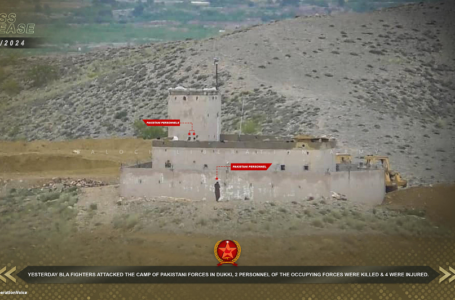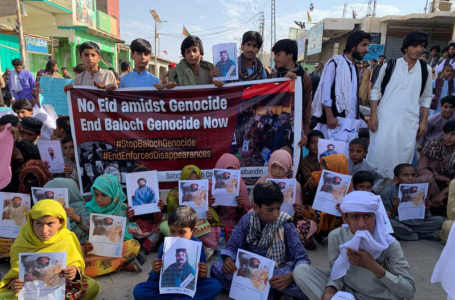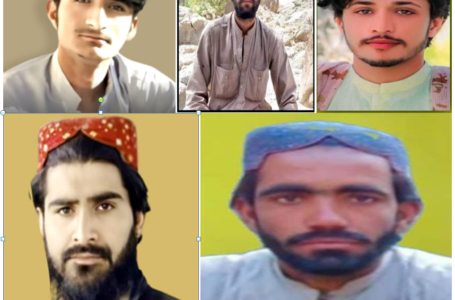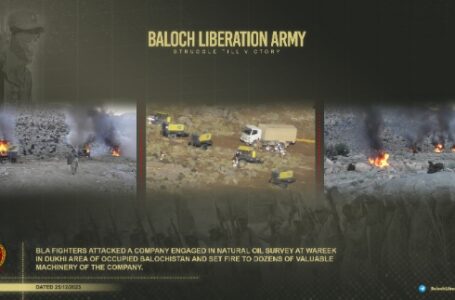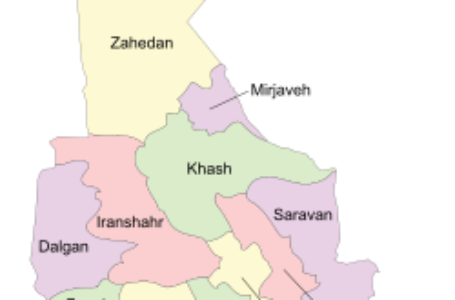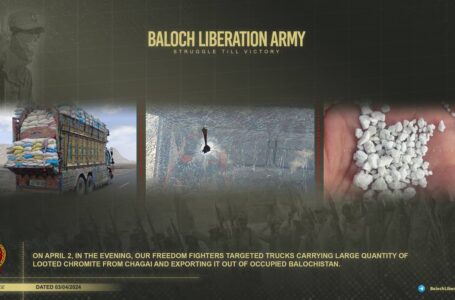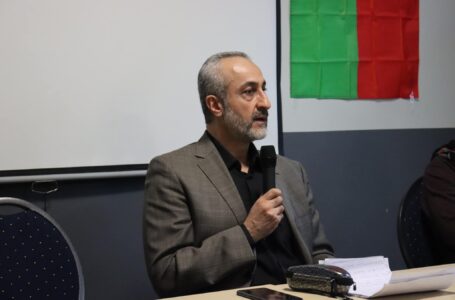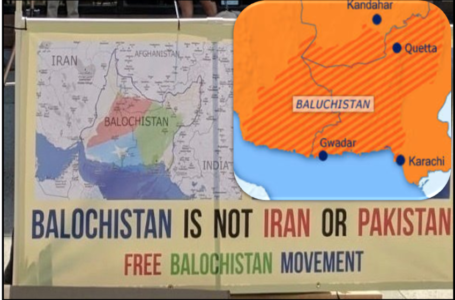Balochistan: Two Personnel of Pakistani Forces Killed in Dukki Attack
The Baloch Refugees

Report by Fateh Jan Baloch
Every year hundreds of thousands of people flee their home countries in search of safe and peaceful places in other countries whereas thousands die on their way trying to reach safety while the same number of people are still left stranded in the streets and cities whereas they live empty stomach and homeless.
Balochistan is also part of this global village which has been ravaged by extreme violence since its occupation by Pakistan in 1948 but due to the media blackout, the international world knows very little about Balochistan. Like any other war-affected region and country, thousands of refugees from Balochistan are also living under appalling conditions in Afghanistan, Iran and in different areas of Sindh and Punjab in Pakistan.
Pakistani intelligence agencies and their hired religious proxies have attacked the houses of Baloch refugees and killed several innocent Baloch in Afghanistan whereas in Sindh and Punjab also Baloch displaced persons have been arrested and disappeared by Pakistani security forces. The silence and inaction of international Human Rights organisations and the United Nation about the plight of Baloch refugees is shocking and beyond comprehension.
Balochistan where surface politics has almost become impossible after Pakistani forces have abducted and killed thousands of innocent Baloch Human Rights activists, students, lawyers, journalists and people from different walks of life. There as guesstimates that more than 5000 people have been killed in custody by Pakistani forces and their dead bodies have been dumped under the notorious ‘kill and dump’ policy of Pakistan’s armed forces.
In January 2014, three mass graves were discovered in Totak area of district Khuzdar in Balochistan which contained around 150 dead bodies, three of whom have been recognised as previously missing persons. The others could not be identified due to disfigurement and the Pakistan FC and other security forces have quickly taken control of the area. The dead bodies recovered from the mass graves were later hastily buried in the darkness of night. All evidence and any clue that could lead to the culprits of this heinous crime have been wiped out. Despite such gross crimes of Pakistan army, the international media and HR organisations have turned a blind eye to the Balochistan crisis.
The Voice for Baloch Missing Persons – which walked around 3000 km from Quetta to Islamabad – argues that at least 20,000 Baloch political prisoners are currently in the custody of Pakistani security forces facing inhuman torture and humiliation. The Baloch journalists who highlight and write about the human rights violations in Balochistan are also abducted and killed by Pakistani security forces.
The continuous human rights violations and ongoing offensives of Pakistani forces in Balochistan have forced many Baloch human rights activists and journalists to seek refuge abroad. The main destination of those who flee Balochistan is the Gulf countries. However, they still need to keep mum over the Pakistani state atrocities in Balochistan or they have to go to democratic countries where they can freely express themselves and exercise their freedom of speech.
The resource-rich Balochistan is 52 percent of Pakistan’s landmass but population wise it is the smallest hence it would not be wrong to say that Balochistan’s richness has put the Baloch nation at risk the most. It is the natural resources of Balochistan that has attracted China in Gwadar to become Pakistan’s crime partner for the exploitation of Baloch natural wealth. Now, the Islamic Republic of Pakistan and Communist China will join hands to repress the Baloch voice which is very alarming. If the civilised world remains silent on Balochistan situation, it could turn into a dangerous human crisis.
Since the Pakistan media ignores the Balochistan issue, Baloch political and human rights activists have been trying to tell their story to the world using other alternatives. Currently, there are hundreds of Baloch activists including journalists in different European countries most of whom, however, live in Germany.
In May 2016 two Baloch activists in Germany have decided to voluntarily go back to Balochistan due to family and personal matters. The residents of Dalsar Mand Balochistan Naeem son of Haji Chakar and Qaboos son of Abdul Karim were sent back on 14 May 2016 but they were arrested and disappeared upon their arrival at Karachi airport. Their families who had gone to Karachi to receive them paid a large sum of money to Federal Investigation Agency (FIA) officials after they assured to released their loved ones. The men, however, have not been released and their whereabouts remain unknown. The families of both men are extremely concerns about the well-being and safety of their relatives.
There is a significant number of Baloch Refugees in Germany who have succeeded in reaching in Europe and applied for political asylum and humanitarian protection under international laws and UN conventions. But, they face numerous difficulties including the issue of interpretation during their interview with immigration authorities because the German authorities provide them Urdu speaking Pakistani translators who – the Baloch refugees complain – do not interpret properly.
Another issue the Baloch refugees face is that most of the Pakistanis in Germany are economic migrants they do not have political problem or fear of prosecution because of their race, colour, religion or political belief whereas the Baloch who managed to reach Germany are political refugees whose lives were in real danger in Balochistan. Hence, the Baloch political refugees fear that if their asylum applications are not successful, they will be forcibly deported to Pakistan where they face arrest, torture and in-custody killing like thousands of other Baloch.
In July last year, the Free Balochistan Movement organised a long march from Germany’s Düsseldorf city to Berlin. The participants of the march walked for more than 20 days before they reached to the German parliament in Berlin with their blistered and injured feet where they recorded their protest and highlighted the ongoing Human Rights violations in Balochistan. They Freedom Balochistan movement’s long march drew the attention of German common public toward the cause and the plight of the Baloch nation. Since then, activists of Free Balochistan Movement have been continuously protesting and organising meetings every now and then in Europe and other Western countries to expose Pakistan’s war crimes in Balochistan and shake the conscience of the civilised world that the issue of Balochistan is not less than Palestine and Syria.
Waheed Baloch – cousin of Naveed Baloch who was wrongfully arrested for last year’s Christmas market attack in Germany – live in a refugee camp in Berlin says, “The most difficult thing for us is when people call us Pakistani. The country that occupied Balochistan and is killing our people is not only a danger to Baloch people but it is a threat to world peace. Calling us (Baloch) as Pakistanis is ludicrous.”
Baloch poet and human rights activist Mohammad Azum says that Baloch in Europe are trying to raise awareness in the civilised world about Pakistan’s bloodbath in Balochistan. “The world especially Europe knows more about Balochistan today as compared to yesterday. The world is slowly learning about the plight of the Baloch nation.” Another Baloch refugee Mohammad Mostafa said that he left his work in Bahrain to come to Europe because the system there cannot save him from Pakistan’s brutalities. “In Gulf states, we cannot express ourselves freely and there is always the danger that they will handover us to Pakistan any time.”
Another Baloch refugee on conditions of anonymity said, “When we protest in Europe and other Western countries, the Pakistani forces in Balochistan punish our loved ones. We have come abroad with the hope that UN will listen to our plea and take action against Pakistan and save our people from Pakistani state brutalities.”
Fateh Jan Baloch is a Journalist with a keen interest in Balochistan’s situation. He also previously used pen name Zamuran Baloch in his writings. This report was originally written in Urdu. It has been translated into English for the reader of BW News and international supporters of the Baloch cause.

